The New Parents’ Guide to Insurance

There's nothing like having a baby to shift your priorities or catapult your sense of responsibility to another dimension. Among the many major life changes you'll have to make, don't forget your Medical Aid and Life Insurance.
Turns out that the people of South Africa were doing more than just binge-watching shows and baking banana bread during lockdown. A 500% increase in search traffic for the topic "Parent" in 2021 points to a baby boom... and those newborns need to be cared for. That's where insurance comes in.
Between the endless cycle of feeds, nappy changes, baths and sleepless nights, you'll also need to consider what kind of coverage will best take care of and provide for your child.
Your two key focus areas (at least when it comes to insurance) are Medical Aid and Life Insurance.
Medical Aid
After all the hours you spent studying the doctors on Grey's Anatomy, when you have a baby you'll wish that you had studied medicine instead. Don't be surprised if you find yourself spending a public holiday sitting in Casualty for what turns out to be a not-even-remotely-life-threatening case of nappy rash. From sniffles (not so simple when conventional nose blowing is not an option) to check-ups, vaccinations and more, babies come with a host of medical costs.
That's why adding your little one as a beneficiary to your medical aid policy is so important. If you're an existing member of a registered medical aid scheme, your newborn baby will receive healthcare cover immediately. But to ensure they're adequately protected with no exclusions, you'll need to report the birth to your medical aid provider as soon as possible – generally within 30 days. You'll also need to provide a copy of the baby's birth certificate as soon as it's available.
Keep in mind that (aside from exceptional circumstances) children under 18 cannot be the main members on a medical aid policy, so if you're looking for more comprehensive cover for your baby, you and/or your partner will need to check your current plan and possibly upgrade to accommodate the needs of your newborn. Child dependant rates are usually considerably lower than main member rates.
Ideally, the policy should cover comprehensive in-hospital cover in case of medical emergencies, day-to-day cover for paediatrician visits and medication, as well as basic dentistry and optometry. Also investigate whether your medical aid scheme has exclusive benefits or a dedicated newborn offering. This can include things like 24/7 support, specialist information and immunisation benefits.
Life Insurance
If you or your partner don't have life insurance or suspect you may be under-insured in that regard, now's the time to take care of business. The minute you become a parent, you'll understand that you need to plan for your baby's future – and whatever that may bring.
Providing for your child is about more than just enrolling them in the best schools. Life insurance can help to ensure that your beneficiaries (which now include your precious child) have enough funds to take care of their needs if you should pass away.
Ideally both parents should have sufficient life cover as either one will face significant financial strain should the other pass on, become disabled, or face severe illness or loss of income. It's best to be covered for all of these eventualities to ensure that your new family is protected.
When selecting your coverage, make sure your child's financial needs, which include everything from bond costs to groceries to education, will be covered.
Ready to be a parent? Of course you aren't, nobody is. But you can at least make sure your family has the best cover available by comparing Medical Aid quotes and comparing Life Insurance quotes with our handy tools.
This article is for informational purposes only and should not be construed as financial, legal or medical advice.
Hippo Blog Categories

































